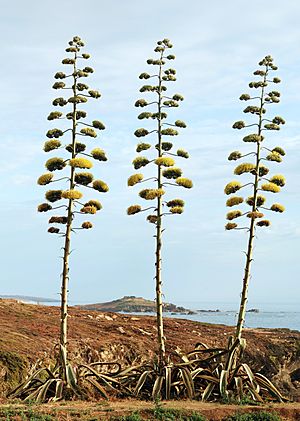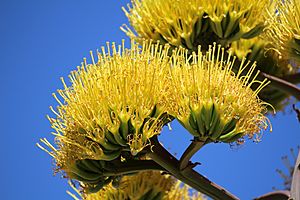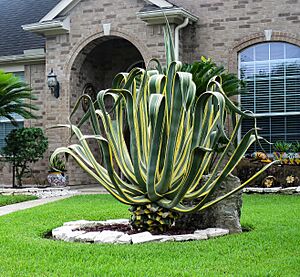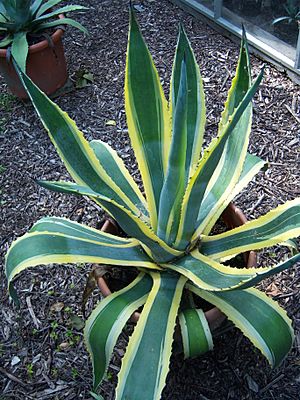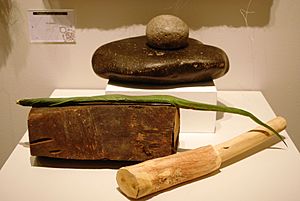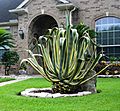Century plant facts for kids
Quick facts for kids Century plant |
|
|---|---|
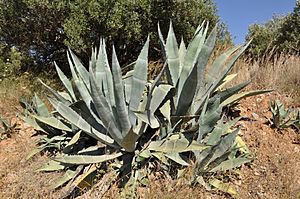 |
|
| Conservation status | |
| Scientific classification |
|
| Kingdom: | Plantae |
| Clade: | Tracheophytes |
| Clade: | Angiosperms |
| Clade: | Monocots |
| Order: | Asparagales |
| Family: | Asparagaceae |
| Subfamily: | Agavoideae |
| Genus: | Agave |
| Species: |
A. americana
|
| Binomial name | |
| Agave americana |
|
| Script error: The function "autoWithCaption" does not exist. | |
| Synonyms | |
|
Synonyms list
|
|
Script error: No such module "Check for conflicting parameters".
The Century Plant, also known as Agave americana, sentry plant, or maguey, is a large flowering plant. It comes from Mexico and Texas in the United States. Even though it's called the "century plant," it usually lives for about 10 to 30 years.
This plant is grown all over the world today. People like it for its unique look in gardens. It has also spread and grown naturally in many places. These include the Caribbean, parts of South America, the Mediterranean Sea area, and parts of Africa, India, China, Thailand, and Australia.
Even though one of its common names is "American aloe," it is not closely related to the Aloe plant.
Contents
What Does the Century Plant Look Like?
The century plant can spread out about 1.8 to 3 meters (6 to 10 feet) wide. Its gray-green leaves are long, about 0.9 to 1.5 meters (3 to 5 feet). Each leaf has sharp edges and a strong spike at its tip. This spike can poke deeply if you are not careful.
Near the end of its life, the plant grows a very tall, branched stalk. This stalk is full of yellow flowers and can reach a height of 7.6 to 9.1 meters (25 to 30 feet). After it flowers, the main plant dies. However, it produces small new plants, called "suckers," from its base. These suckers continue the plant's growth. This way of flowering only once at the end of its life is why it is called the "century plant."
How Scientists Name Plants
The Agave americana was first described by a famous scientist named Carl Linnaeus in 1753. He gave it the scientific name Agave americana, which is still used today. This way of naming plants with two parts is called Binomial nomenclature.
Growing Century Plants
People grow Agave americana as an ornamental plant. This means it's grown for its beauty and dramatic shape. It is often used in gardens that need plants that can handle dry weather, like drought-tolerant gardens or cactus gardens. It is very popular in hot places where there isn't much rain.
You can often see these plants in areas with Spanish colonial and Mexican styles. This includes the Southwestern United States, California, and dry parts of Mexico. They are also a common sight in dry beach gardens in Florida and other coastal areas in the Southern United States.
Different Types of Century Plants
There are a few different types of Agave americana. Scientists recognize two main types, called subspecies, and two varieties. There are also many special types, called cultivars, that people have grown. Some popular ones include:
- 'Marginata': This type has yellow stripes along the edges of its leaves.
- 'Mediopicta': This one has a wide cream-colored stripe down the middle of its leaves.
- 'Mediopicta Alba': This type has a white stripe in the middle.
- 'Mediopicta Aurea': This one has a yellow stripe in the middle.
Some of these types, like 'Marginata' and 'Mediopicta', have won awards for being great garden plants.
How People Use the Century Plant
Food and Drink
If you cut the flower stem before the plant blooms, a sweet liquid collects inside. This liquid is called aguamiel, which means "honey water." This aguamiel can be fermented to make an alcoholic drink called pulque.
The leaves of the century plant also provide strong fibers. These fibers are known as pita. People use pita to make rope, mats, or rough cloth. They are also used to decorate leather with a special type of embroidery called piteado. Both pulque and the agave fibers were very important in Mexico before Europeans arrived. The fermented drink was known as octli back then.
In Mexico, especially where tequila is made, agave plants are called mezcales. A strong alcoholic drink called mezcal is made by distilling fermented agave. Agave americana is one of the types of agave used to make mezcal. A very famous type of mezcal is tequila, which is made from a specific agave called "blue agave" (Agave tequilana).
Mezcal and tequila are different from pulque. For mezcal and tequila, the sweet parts of the plant, called piñas (or hearts), are heated in ovens to get their sugars. For pulque, the aguamiel is collected from the cut stalk.
Agave nectar is also sold as a natural sugar. It has a lot of fructose, which means it has a low glycemic index.
Images for kids
See also
 In Spanish: Agave amarillo para niños
In Spanish: Agave amarillo para niños
 | William Lucy |
 | Charles Hayes |
 | Cleveland Robinson |



